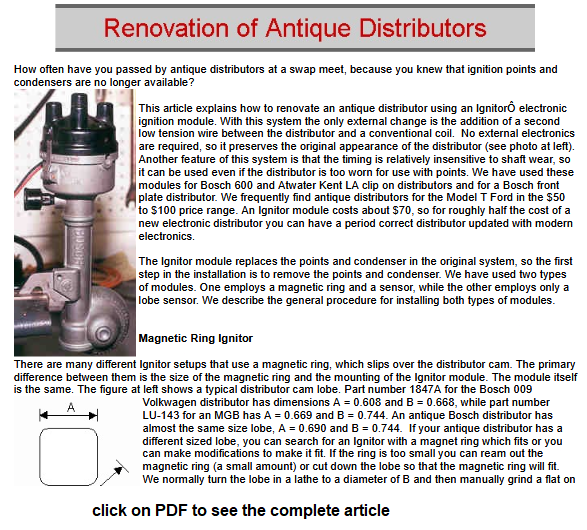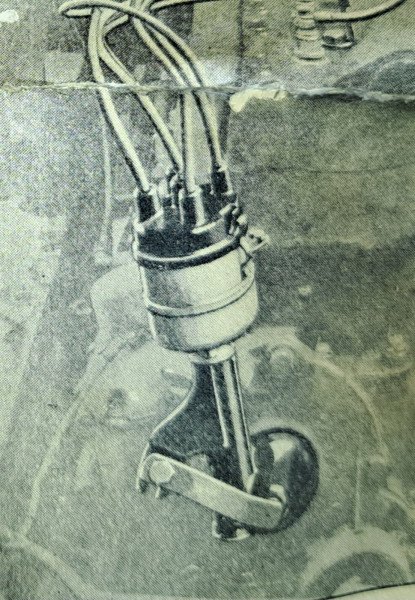Page 1 of 1
American Bosch distributors with centrifugal advance
Posted: Mon Mar 10, 2025 2:55 pm
by ewdysar
I know that there were some period centrifugal advance distributors with mechanical advance arms too. What was the purpose of both methods of advancement in one unit and how would it be used in practice?
Eric
Re: American Bosch distributors with centrifugal advance
Posted: Mon Mar 10, 2025 4:14 pm
by Craig Leach
Hi Eric,
The advance systems are not all the same & the distributers did not all use the same coils & power supplies. The 600 style ran off the Ford
magneto for power & one Ford coil. The 600-A used the stating & lighting battery W/ a resistor & one ford coil W/ the vibrator screw run down.
The 600-B used battery & a special Bosch coil ( modern style ) According to the Bosch instruction the lever is only needed when hand cranking
the engine & also if running the battery system on the Mag if the battery has gone dead ( only for a short time) I personally like to have some
control over my timing while driving. Bosch didn't think it was needed. As far as I know they will all work off battery & a modern coil.
Craig.
Re: American Bosch distributors with centrifugal advance
Posted: Mon Mar 10, 2025 4:38 pm
by ewdysar
Thanks Craig,
So the mechanical advance arm was to provide additional retard for starting only, leaving the centrifugal advance for regular advance curve beginning around 6-8 deg btdc at idle to whatever the top of the curve (maybe 26 btdc at 2000rpm?) I have read that the rule of thumb is 10-12 deg of increased advance per 1000 rpm
Which leads to the next question. Does anyone know the American Bosch centrifugal advance curve (not including any mechanical advance arm adjustments)? There's plenty of similar data available for modern distributors. Most modern curves assume an idle speed of 750-800 rpm with advance starting around 1000 rpm and I believe that a Model T curve needs to start and finish lower.
Eric
Re: American Bosch distributors with centrifugal advance
Posted: Mon Mar 10, 2025 8:03 pm
by Mark Gregush
The 600 series Bosch could be powered in the different configurations the Craig posted. There were different heads units: combination of manual and centrifugal advance/retard and fully automated centrifugal advance/retard with no manual control with possibly a 3rd that did not have any auto advance/retard that was fully manually controlled.
What the advance/retard curve is, don't know but with the fully automated one, did not seem to have enough advance for driving today when I used one.
Re: American Bosch distributors with centrifugal advance
Posted: Tue Mar 11, 2025 3:56 am
by TRDxB2
ewdysar wrote: ↑Mon Mar 10, 2025 4:38 pm
Thanks Craig,
So the mechanical advance arm was to provide additional retard for starting only, leaving the centrifugal advance for regular advance curve beginning around 6-8 deg btdc at idle to whatever the top of the curve (maybe 26 btdc at 2000rpm?) I have read that the rule of thumb is 10-12 deg of increased advance per 1000 rpm
Which leads to the next question. Does anyone know the American Bosch centrifugal advance curve (not including any mechanical advance arm adjustments)? There's plenty of similar data available for modern distributors. Most modern curves assume an idle speed of 750-800 rpm with advance starting around 1000 rpm and I believe that a Model T curve needs to start and finish lower.
Eric
I have this article
--

- bos dit.png (177.61 KiB) Viewed 2869 times
--
--
Re: American Bosch distributors with centrifugal advance
Posted: Tue Mar 11, 2025 3:57 am
by TRDxB2
last page................
--
--
--
There were 3 different clip on models that I am aware of -
The one on the right I believe was the early version
--
--
this was the most rare 600 D a later version
--

- Instructions 2.jpg (93.63 KiB) Viewed 2868 times
Re: American Bosch distributors with centrifugal advance
Posted: Tue Mar 11, 2025 6:44 am
by KWTownsend
Eric, thirty years ago I had a disturbutor on my Model T. It was a centrifugal advance, but wired closed so it was manual only. It worked ok. Been running Ford coils ever since Ron Patterson edumacated me.
Let's get together soon.
Keith
Re: American Bosch distributors with centrifugal advance
Posted: Tue Mar 11, 2025 3:42 pm
by ewdysar
Thanks Frank.
Great info, especially the green box of regular operating instructions.
Hi Keith,
I agree, I am a solid timer/coils guy, I even have a set of fresh RP wood box coils in my '14. However, my '27 runabout (built for John Conners) came to me with a Rajo with a Winfield S and a "3 in 1" front plate with distributor, oil pump and water pump (as seen in the "Speed and Sport" book). I haven't been able to dial in the manual timing process as well as I would like, so this is all research into cleaning up that installation.
I'm still planning on being at the RCMTC meeting this month, I hope to see you there.
Eric
Re: American Bosch distributors with centrifugal advance
Posted: Tue Mar 11, 2025 5:49 pm
by Ron Patterson
Eric
I read this thread with great interest.
It would be nice to compile the technical details of all these different distrubutor systems used on Model T's into a technical reference book.
A decription of each type, how the advance mechanisms worked and the electrical details how the spark was produced and dsitributed to each engine cylinder.
Kinda like we did with all the different types of hand cranked coil testers, but for the various Model T distributors.
My guess is the Model T hobby would love to have this type of research and reference for future use.
The same holds true for all the various magnetos that were available during the Model T's era.
Ron Patterson
Re: American Bosch distributors with centrifugal advance
Posted: Wed Mar 12, 2025 3:40 pm
by Tim Williams
I agree with Ron. A book or reference guide for distributors and magnetos would be a great resource.
Tim
Re: American Bosch distributors with centrifugal advance
Posted: Thu Mar 13, 2025 2:48 pm
by ewdysar
I've read posts here where folks have used a distributer diagnostic machine to check the overall health and possibly tune their advance curves. If anyone has access to one of those machines in the greater Portland, OR area, I will gladly pull my distributor to document its specs. My distributor does appear to have centrifugal advance and I would like to know how much and when.
Testing other distributors, original (Bosch, Atwater Kent, etc.) or modern from our vendors (Snyders, Langs, Texas T, etc.) could start building that knowledge base.
Of course, the centrifugal advance info would be just one (short?) chapter, with the mechanical only versions, various firing solutions, operating tips, and maybe even mounting solutions (clip-on or front plates) adding more depth to the book.
Does anyone know the limitations around using a manufacturer's published product info in a reference book like this?
Eric
Re: American Bosch distributors with centrifugal advance
Posted: Thu Mar 13, 2025 4:38 pm
by Mark Gregush
Personally, don't know of anyone with equipment that could check a clip-on type of distributor. You might have to do some digging RE any published information in regarded to your question, there might be something in one of the old posts. Biggest issue I see with these old used units is that the wear in the casting allows a lot of differences in firing time because the point gap distance changes and shaft wobble along with worn cams.
Suppose if you really wanted to know, you could use a degree wheel and check how far the auto advance opens and then what movement the whole head moves after the auto advance after reaching it max. That should put one in the ballpark.
Re: American Bosch distributors with centrifugal advance
Posted: Mon Mar 31, 2025 1:49 pm
by CamMan
I run a Bosch 600 on my Tudor. It is converted to use a Pertronix Ignitor as described at the Tulsa website. I measured the advance curve for it, but I'm not sure which advance mechanism it was. I found it was very similar to a Volkswagen 009. Normally you want around 30 degrees at speed and 0 for starting, so I retard it to start and then advance it. The type without manual advance tend to break when you tighten the head, so I prefer the type with manual advance. They are a pain to set up because it can only be advanced over a small range.